Unlock your genetic potential or gift the power of personalized health. Browse our Supersaver Packs now.
Want to know how your genetic makeup impacts your health, ancestry, and fitness? Sequencing.com might provide the answers you need. As the DNA testing industry grows, Sequencing.com distinguishes itself by offering both affordability and comprehensive analysis. Founded by a leading genetics expert, this platform is changing the way genetic testing is approached. It provides advanced genetic analysis tools and a broad marketplace of DNA-related applications. Explore what Sequencing.com can offer and decide if it’s the right fit for your needs.
Sequencing.com is a DNA testing company that also offers a platform for various DNA-related apps.
Their marketplace includes both free and paid options for services such as ancestry analysis, health reports, and nutrition recommendations.
The company was founded by Dr. Brandon Colby, a genetics expert who earned an MD from Mount Sinai School of Medicine.
Sequencing.com aims to make genetic testing more affordable and accessible.
It provides free, unlimited DNA data storage to ensure secure storage, meaningful interpretation, and privacy of genetic data.
Additionally, the company offers detailed reports and tools that turn complex genetic information into practical health advice.
Sequencing.com provides a straightforward process for accessing genetic insights:
Sequencing.com offers an advanced Whole-Genome Sequencing (WGS) service that provides a detailed analysis of an individual's complete DNA.
While standard DNA tests analyze less than 0.1% of the genome, Sequencing.com's WGS covers the whole genome, including about 30,000 genes and 3 billion variants.
This service, which used to be very expensive, is now available at a more economical rate through Sequencing.com.
With a 'Privacy Forever' guarantee, Sequencing.com ensures that your data is never sold or shared.
WGS offers features like the Wellness and Longevity View and Genome Explorer and complete access to both raw and analyzed genome data.
These features make it valuable for both individuals and healthcare professionals.
Sequencing.com lets you easily import your DNA data if you've tested with 23andMe, MyHeritage, FamilyTreeDNA, Living DNA, HomeDNA, Vitagene, or DNA Land.
You can either import your data directly into your account or upload it from your PC.
Here’s how to do it in a few simple actions:
Your file is typically uploaded to Sequencing.com account within 15 minutes.
Already taken an ancestry genetic test with companies like 23andMe, AncestryDNA, MyHeritage, etc.? You can now upload your raw DNA files to access over 10 health and wellness reports (including methylation reports) starting from $30.
| Category | Trait | Free/Price |
| Health | Next-Gen Disease Screen | Free |
| Health Scan | Free | |
| Healthcare Pro | $199 | |
| Hormone Health | $59 | |
| Female Sexual & Reproductive Health | $59 | |
| Prevent Breast Cancer | $19 | |
| Inflammation And Immunity | $59 | |
| Cardiovascular DNA Wellness Report | $59 | |
| Disease Risk Genetic Test Report | $59 | |
| Healthy Heart | Free | |
| Immune System & Infectious Diseases | $19 | |
| Malignant Hyperthermia | $19 | |
| Basic Wellness | $4.99 | |
| Blood Traits and Conditions | $19 | |
| Birth Control Pill Risk | $1 | |
| Will Aspirin Help | $1 | |
| Promethease | Free | |
| Ancestry | Genetic Ancestry with Haplogroups | $59 |
| World Ancestry Report | $79 | |
| Map My Genes Archaeology Edition | $19.99 | |
| Map My Genes | $19.99 | |
| DNA Ancestry and Genealogy Report | $10.99 | |
| Am I An Einstein | Free | |
| Am I Related To Trump? | Free | |
| Relative Matching | DNA Family Finder | Free | |
| Am I Related? Relatedness Calculator | $9.99 | |
| Ancient Ancestry DNA and Me | Free | |
| Nutrition | Nutrigenomics: Nutrition Analysis | $29 |
| Nourish | $59 | |
| Weight Loss | $139 | |
| Beauty | Genetic Risk of Hair Loss | $19.99 |
| Health/Nutrition | Gut Health | $59 |
| Lactose Intolerance | Free | |
| Health/Nutrition/Fitness/Lifestyle | Empower | $59 |
| Bioinformatics/Health | Genome Explorer v3 | Free |
| Health/Lifestyle/Children | Brain Health: Mental Health & Mood | $59 |
| Cognitive Function Genetic Test Report | $59 | |
| Comprehensive Wellness | $189 | |
| Health/Children | Wellness and Longevity | $199 |
| Complete Genome Analysis | $189 | |
| Medication & Drug Response | $59 | |
| Inherited Traits Genetic Analysis | $129 | |
| Prevent Sudden Death | $19 | |
| Carrier Status | $29 | |
| Alzheimer’s Risk | APOE Gene Analysis | $39 | |
| MTHFR DNA Wellness Report | $29 | |
| Health/Lifestyle | Psychedelics PGx: Complete DNA Guide | $149 |
| Cannabis DNA Health Report | $29.99 | |
| Weather My Way +RTP | Free | |
| Enhanced Longevity | $59 | |
| My Personality Traits | $59 | |
| Arthritis Prevention | $9.99 | |
| Age with Strength | $4 | |
| Health/Nutrition/Children | Vitamins DNA Wellness Report | $39 |
| Blood Type Analysis | Free | |
| Health/Beauty | Melanoma Skin Cancer Prevention | $9.99 |
| Ancestry/Beauty/Children/Art/Bioinformatics | DNA Selfie | Appearance Predictor | $4.99 |
| Art | DNA Art | $299 |
| Health/Lifestyle/Children/Beauty | Genetic Detoxification | $69 |
| Sleep DNA Wellness Report | $39 | |
| Ancestry/Children | Santa and Me | Compare Your DNA to St. Nick | Free |
| Lifestyle/Children/Nutrition | Healthy Nutrition | $39 |
| Lifestyle/Nutrition | DNA Diet | $59 |
| Health/Nutrition/Fitness/Lifestyle/Children | TBG Total Wellness | $119 |
| Health/Fitness | Athletic Performance | Free |
| Health/Nutrition/Children/Bioinformatics | Genetic Counseling | $179 |
| Lifestyle/Beauty | Longevity DNA | $139 |
| Skin Genes | $59 | |
| Lifestyle/Fitness | Gene-In-Form Personalized Fitness | $49 |
| Children/Lifestyle | Personality DNA | $99 |
| Thrive | $59 | |
| Beauty/Children | Physical Appearance Genetic Report | $19 |
| Fitness/Children | Sports and Exercise | $99 |
| Fitness | RunDNA | $59 |
| Athletic Training Pro | $169 | |
| Fitness DNA Test Report | $29 | |
| Bioinformatics | Genome VCF | $19.99 |
| Sequencing Depth and Coverage | $9.99 | |
| Variant Effect Predictor | $19.99 | |
| Variant Discovery | $19 | |
| Imputation Analysis | $9.99 | |
| EvE Premium | $19.99 | |
| Short Read Mapper | $249 | |
| Clinical Annotator of Variants | $19.99 | |
| Genome Overview | $29.99 |
Navigating the Marketplace is relatively straightforward.
Users can search for specific apps or browse categories to find relevant reports.
The platform is designed to be user-friendly, allowing for easy access to both free and paid services. Some notable apps include:
Despite the variety of tools available, users have expressed concerns regarding the quality and comprehensiveness of the reports.
Some reports are noted to be dense and complex, potentially overwhelming for those without a background in genetics.
Additionally, the pricing structure can lead to unexpected costs, as many reports require separate purchases beyond the initial membership fee.
Based on forum discussions and social media conversations, users' experiences with Sequencing.com appear mixed.
Many are intrigued by the affordable whole genome sequencing offered, especially compared to earlier prices.
However, questions persist about the accuracy and comprehensiveness of results, particularly for rare disease and ancestry testing.
A recent review on Reddit highlights some challenges with Sequencing.com. The user appreciated the promise of privacy protection and the range of genealogy apps offered.
However, they encountered issues with importing Ancestry.com data, unclear privacy policies, and discrepancies in in-app discounts.
The review also mentioned that some apps appeared unavailable and that membership options were only disclosed after registration.
While the user is still hopeful about the service's potential, they expressed concerns about privacy and app accessibility.
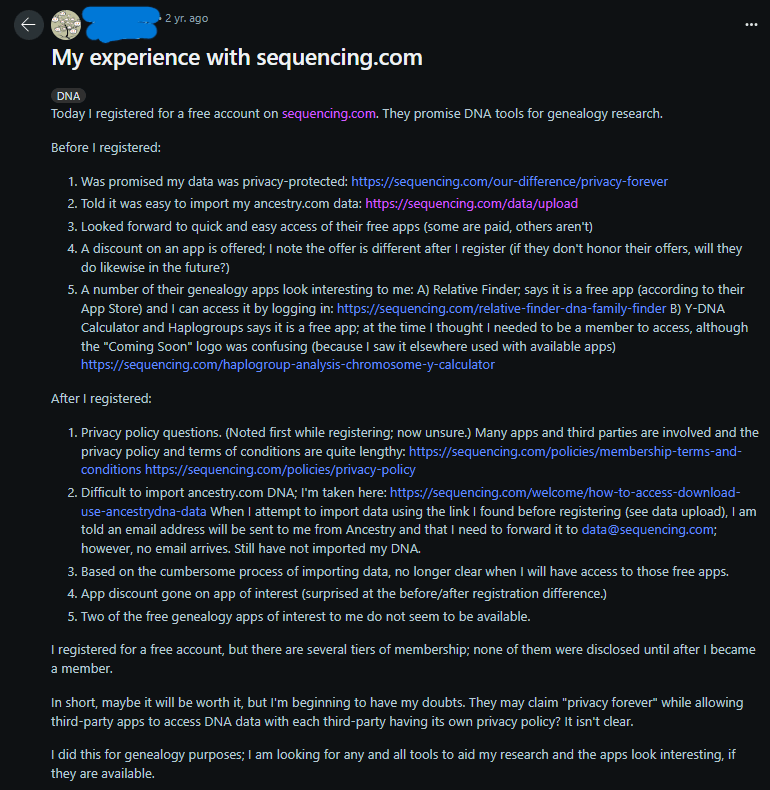
Yes, Sequencing.com offers medical-grade DNA testing. They provide two key tests: the Ultimate DNA Test and the Ultimate Genome Sequencing.
The Ultimate DNA Test utilizes advanced microarray technology to examine over 30 million genetic variants.
On the other hand, the Ultimate Genome Sequencing offers clinical-grade 30x whole genome sequencing, covering your entire genome. This test also includes screening for over 2,000 genetic conditions.
Moreover, through their DNA App Store, you can explore numerous reports that deliver comprehensive insights into your health and well-being.
Sequencing.com holds an A+ accreditation from the Better Business Bureau and has gathered multiple reviews on its site, with an average rating of 3 out of 5 stars.
While some negative feedback relates to customer support, it seems that these issues have been addressed.
On TrustPilot, Sequencing.com has an average rating of 4.0 out of 5 stars. Many users appreciate the platform's ease of use and the valuable information it provides.
Customers have expressed their satisfaction with Sequencing.com, as seen in these reviews from Sequencing.com's testimonial page and TrustPilot:
One customer shared, "Mind-blowing insights! Everyone should have this information about their genetic makeup!"
Another customer expressed, "The results are real and true assessment. We discovered valuable information about my son's genetic conditions."
One user highlights, "I love this DNA Company. The monthly updates on health results are incredibly useful."
Anotheq reviewer mentions, "I am very satisfied with my experience ordering genetic testing from Sequencing. The disease screen and ancestry reports are fantastic."
Additionally, Sequencing.com is discussed on Reddit, where users and the company engage in conversations about their experiences.
This site is great. I’d been watching a lot of the Gary Becka videos about methylation tests and how they can help identify gene mutations and since we had already done a dna test with ancestry dna it was easy to just drop in our raw data from there and within just 1 day we had our results and are working towards our health now knowing ourselves better. At a much lower cost it’s a no brainer.
- John PerryReally great value compared to other medication gene testing, & you can see which genes you have & can cause affects to medication so even if they don’t have every single medication you need on the long list they give, you can research what medications are metabolized by said gene & learn even more. Really glad I found them 100% worth it. $25-$40 compared to $500-$900 for the same thing.
- N. Watson
Sequencing.com offers DNA testing and analysis services with a focus on affordability and accessibility.
They provide WGS, a detailed analysis of your entire genetic makeup.
You can upload DNA data from services like 23andMe, AncestryDNA, or MyHeritage or use their at-home DNA test kit.
Sequencing.com also offers a marketplace with various DNA-related apps for health, ancestry, nutrition, and more.
Customer reviews on Sequencing.com's website and Trustpilot are generally positive, highlighting valuable health insights and detailed reports.
However, a Reddit review raises concerns about data import issues, unclear privacy policies, and app accessibility.
While Sequencing.com provides medical-grade DNA testing, reviewing both positive and negative feedback is essential before making a choice.
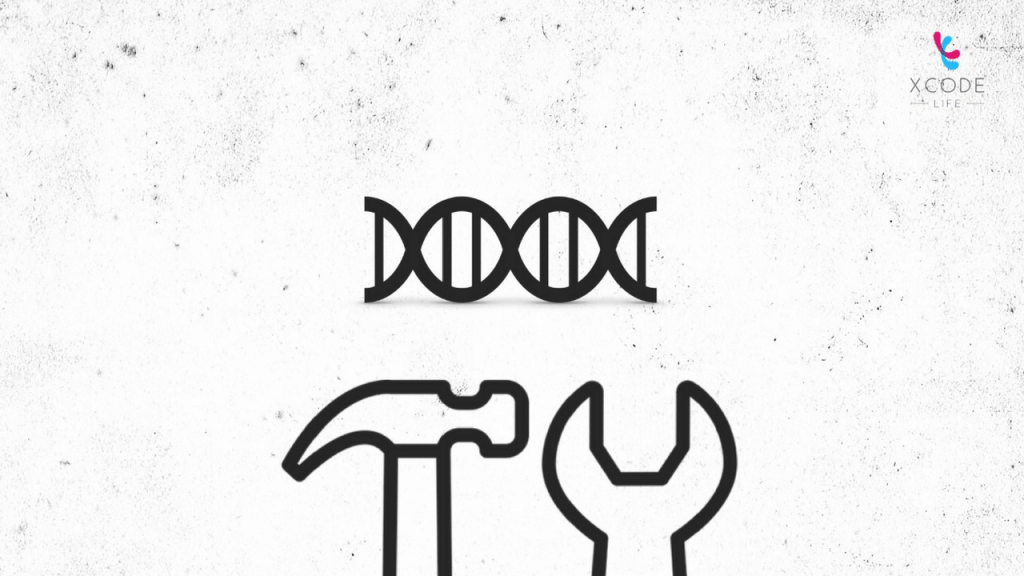
2024 Update: Free Tools For 23andMe, AncestryDNA, FTDNA Raw Data Analysis

Family Tree DNA Review: What You Need To Know In 2024
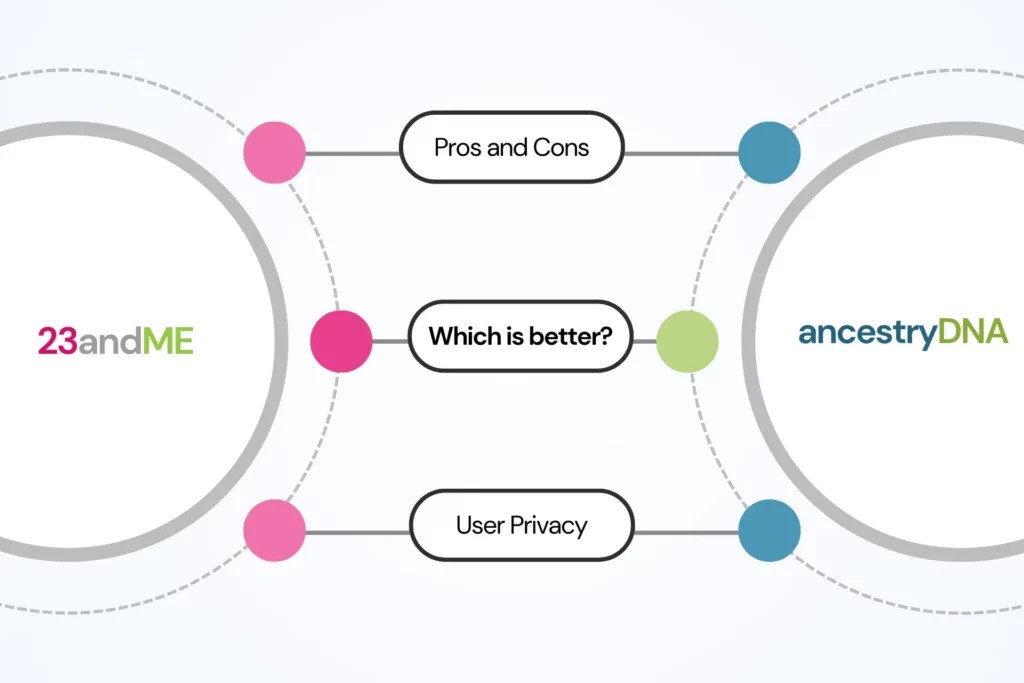
AncestryDNA vs 23andMe: Which Is Better For Raw Data Analysis?
https://www.bbb.org/us/ca/pasadena/profile/biotechnology/sequencingcom-1216-1078918/customer-reviews
https://www.trustpilot.com/review/sequencing.com
If the confusing numbers and letters in your raw DNA data have left you scratching your head, you aren’t alone. Sites like 23andme, Ancestry, or MyHeritage DNA present your raw DNA data in a tabular format, with one column reserved for RSIDs. But what are RSIDs? Why do they matter? Why do they look so complicated? This article will answer all these questions, telling you everything you need to know about RSIDs and what they mean for your genetic report.
The term RSID stands for Reference SNP-cluster IDentification.
RSIDs are standard naming conventions for SNPs.
SNPs are short for single nucleotide polymorphisms.
They represent individual nucleotides on your DNA that have been mutated.
Mutations could happen by chance or be inherited from your parents.
These regions are called polymorphisms because they usually differ from person to person.
Scientists study DNA nucleotide-by-nucleotide (letter-by-letter) against a reference DNA sequence representing the human genome.
If they find a mismatch or a novel region, it is termed an SNP and denoted using an RSID.
When a researcher identifies an RSID, the mutated sequence is passed through a database that matches the sequence to a known RSID.
The format of an RSID is ‘rs’ followed by a number without a fixed length.
This number is incremental and grows with each new SNP that scientists discover.
A smaller or larger RSID number merely means it was discovered earlier or later, respectively.
It is unrelated to the SNP’s position in the genome and has no other biological significance.
Scientists usually assign RSIDs to the following genetic variations:
These indicate variations in just one nucleotide.
For instance, nucleotide T may replace nucleotide C at a certain position in your DNA.
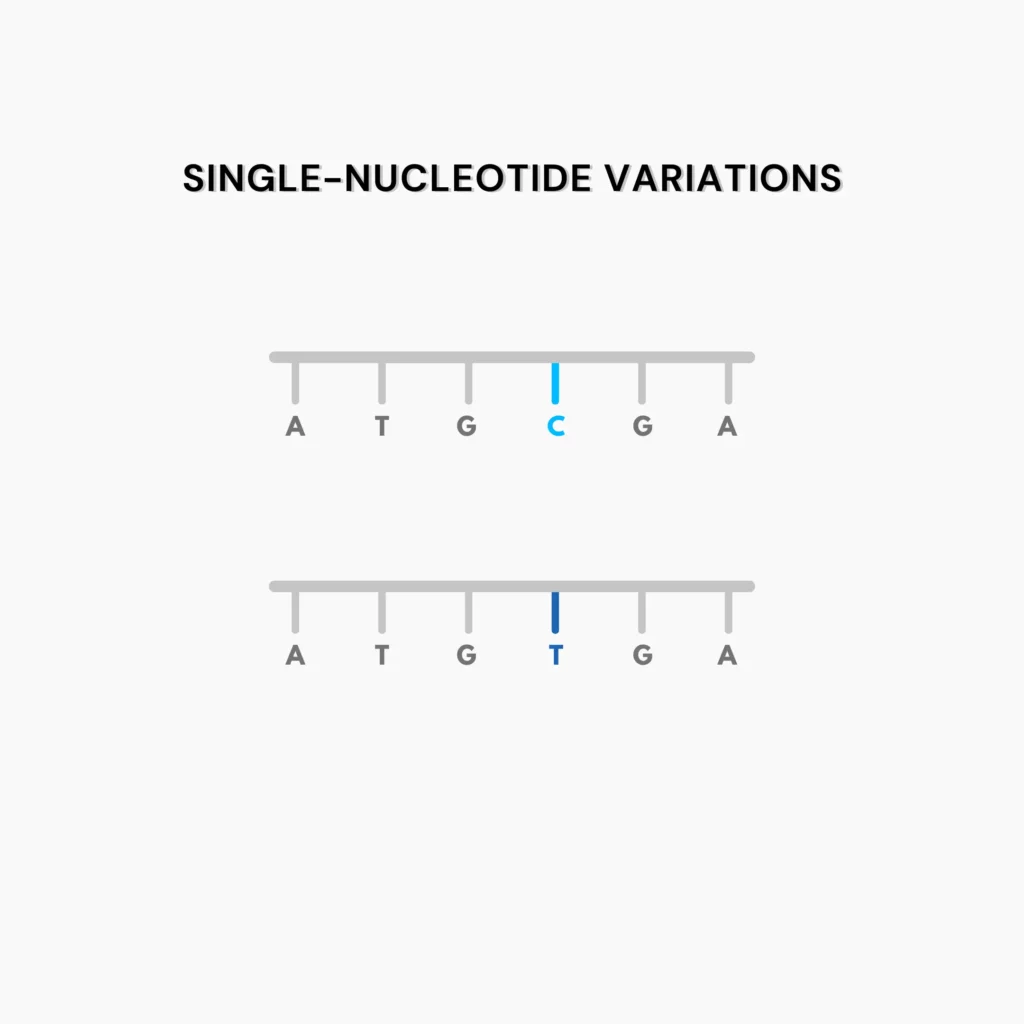
These imply variations in more than one nucleotide at a time.
For example, the nucleotide sequence ATCC at a certain position in your DNA may be replaced with the sequence TCGA.
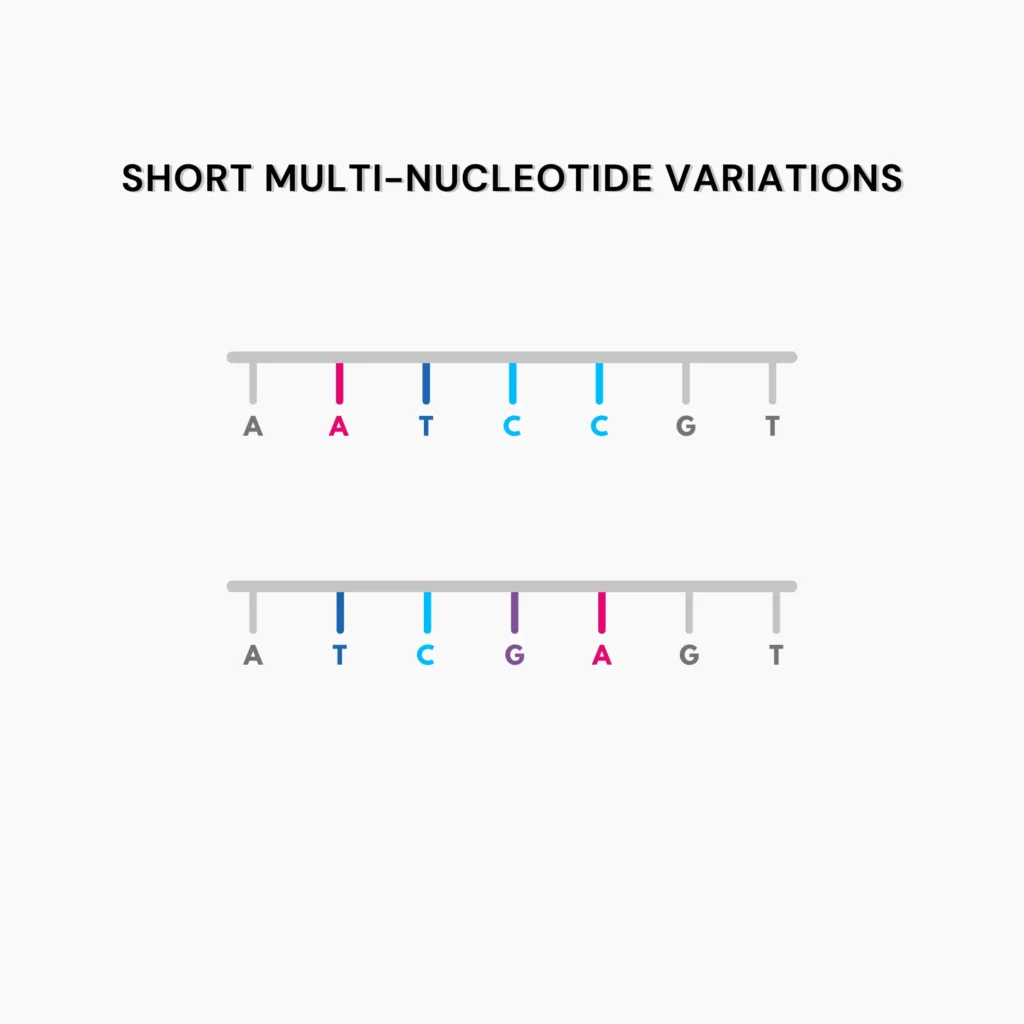
Deletions or insertions are types of genetic mutations often seen in DNA.
Deletions refer to missing nucleotides.
Say that the reference genome has the nucleotide C at a given position.
Deletion means that your DNA would be missing the C nucleotide at that position, shortening the sequence.
On the other hand, insertions refer to extraneous nucleotides.
For instance, your DNA could have the sequence CTA instead of C at the same position, lengthening the sequence.
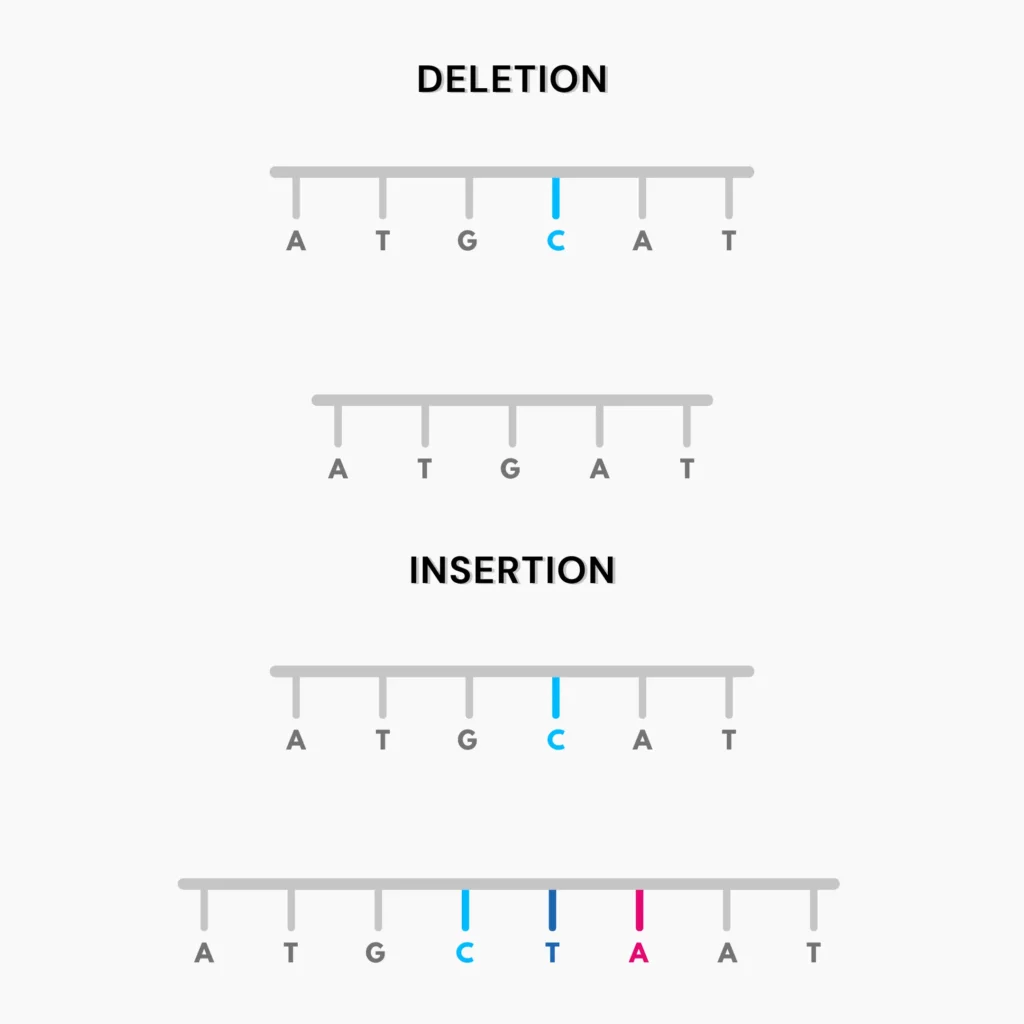
Short tandem repeats (STRs) are sequences up to 6 nucleotides long that occur repeatedly in your genome.
They are highly polymorphic, meaning they are subject to slight mutations and differ from person to person.
Mutations or changes in STRs in your DNA are thus valid SNPs and are denoted by RSIDs.
Retrotransposons are genetic elements that flit around the genome at random.
They replicate several times, inserting DNA sequences at each of their destinations.
Thus, your DNA is bound to have a few retrotransposable elements at random positions.
A raw DNA data file contains tens of thousands of RSIDs on average.
However, an RSID doesn’t always spell trouble.
SNPs generally confer an increased likelihood of you having a particular trait.
These traits could be, but are not limited to:
Dozens of RSIDs govern any given trait.
Some RSIDs have more significant effects than others.
Their collective effect determines the presence of the trait in your DNA.
Genetic analysis companies weigh all the RSIDs in your DNA based on their significance to make recommendations for your lifestyle and well-being.
RSIDs and SNPs are one and the same.
SNPs are changes in your DNA, and RSIDs are methods of notating them.
SNPs are unexpected changes in the genome.
Thus, they can be termed mutations.
However, not all mutations are SNPs.
Restriction fragment length polymorphism (RFLP) is the simplest method to detect SNPs.
Certain enzymes can recognize specific sequences in DNA to cleave it at that position.
The presence of an SNP in these sequences would render the enzyme unable to cleave the DNA.
Thus, longer fragments indicate the presence of a SNP.
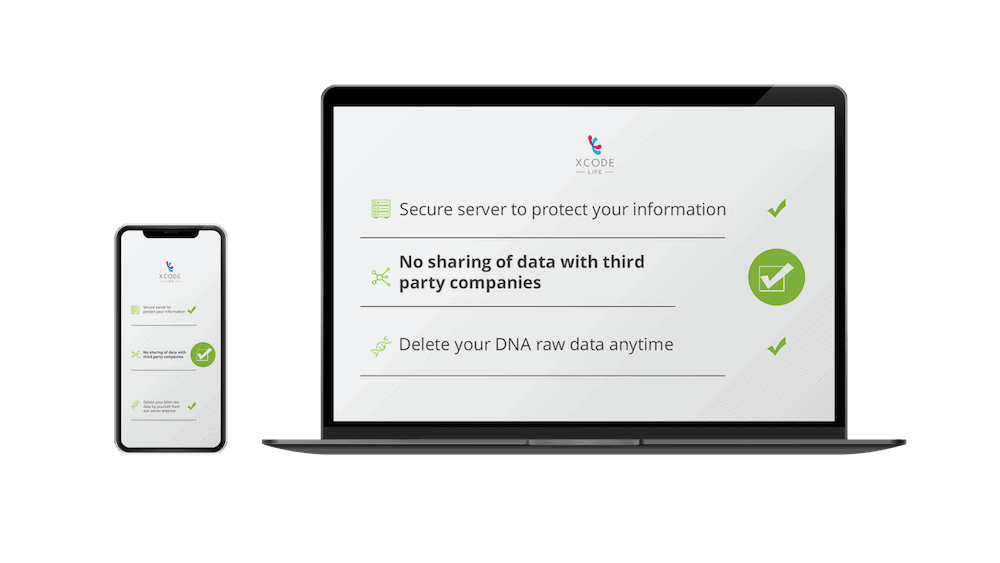
5 Ways Xcode Life Protects Your DNA Data

Analyze Your DNA Data For Depression – 2023 Updates

Are You A Morning Person? Analyze your DNA Raw Data To Find Out
https://customercare.23andme.com/hc/en-us/articles/212196908-What-Are-RS-Numbers-Rsid
https://www.ncbi.nlm.nih.gov/snp/docs/RefSNP_about
https://www.britannica.com/science/retrotransposon
https://www.genome.gov/genetics-glossary/Restriction-Fragment-Length-Polymorphism
The world of genetic testing is boundless, with several insights and traits available at your fingertips. AncestryDNA and 23andMe are two of the top players in this field, offering quality services to their consumers. Comprehensive DNA testing helps customers learn about their ancestry, health, and wellness. Both companies do a good job, but which one is better? This article will serve as a detailed review and comparison of AncestryDNA vs 23andme.
23andMe is a personal genomics company headquartered in California.
It was founded in 2006.
Since then, the company has sold more than 12.5 million DNA kits.
23andMe's mission is to help people access, understand, and benefit from the information present in the human genome.
23andMe offers four kinds of personal genetic services.
Health + Ancestry—Opting for this service will allow you to access more than 150 reports in the following categories.
| Service | Description | Price |
| Ancestry | Ancestry breakdown and 30+ trait reports– 80+ personalized reports– Ancestry percentages (to the 0.1%)– 2750+ geographic regions | $99 |
| Health + Ancestry | Everything in Ancestry service +– 150+ personalized reports– FDA-authorized reports– FSA/HSA eligibility | $199 |
| 23andMe+ Premium | Everything in Health + Ancestry service +– Heart health and personalized medicine reports– Health tracker– Health action plan– Historical Matches (new feature) | $199 for the first year, $69/yr after |
| 23andMe+ Total Health | Everything in 23andMe+ Premium +– Next-generation exome sequencing– Biannual blood testing– Access to clinicians | $999 for the first year, $499/yr after |
Did You Know? You can use your AncestryDNA test data to get up to 11 additional health and wellness reports from as low as $30. No new DNA test required. Reports within 24 hours.
AncestryDNA is a part of Ancestry LLC, founded in 1996.
Its parent company is based out of Utah.
The company has sold over 26 million testing kits to date.
AncestryDNA focuses exclusively on a person's ancestral traits and origin. The Ancestry website offers two kinds of testing services.
| Service | Description | Price |
| AncestryDNA | – Origins and ethnicity, including geographical regions– DNA matches to connect with your DNA relatives | $99$99 |
| AncestryDNA+ World Explorer Membership | Everything in AncestryDNA +– Access to over 40 billion records– 75+ traits on nutrition, fitness, and appearance – DNA Inheritance | $100, followed by $99.95 every 3 months $100, followed by $99.95 every 3 months |
| AncestryDNA+ All Access Membership | Everything in AncestryDNA + World Explorer Membership +– News articles and photos– Military records on Fold3– Up to 4 additional accounts | $199, followed by $149 every 3 months$199, followed by $149 every 3 months |
| Category | AncestryDNA | 23andMe |
| Ancestry services | More detailed and accurate – 25 million people in the database, more advanced tools | 50+ reports over 3000 regions, yet less detailed and accurate |
| Health services | Limited number of traits, no FDA approval | Many traits across 5 different health categories, FDA-approved |
| Cost | $99-$199 | $99-$999 |
| Timeline | 6-8 weeks after your sample is received; 12 weeks overall | 4-6 weeks from the time a sample is received at the lab; 10 weeks overall |
| DNA raw data download | Allowed | Allowed (was temporarily suspended due to a hack) |
Privacy is always a concern when you let any company access your personal information.
Users should be aware of what information these companies collect, store, and share with third parties.
Both companies have similar terms and conditions in their privacy policies.
AncestryDNA stores DNA details and samples without using your name or other personal information.
Both companies allow you to:
Note: Recently, 23andMe faced a massive hack that put the data of millions of people in jeopardy. Please review their policy in detail and talk to the customer care representatives for more clarity.
To get your 23andMe raw data, follow the instructions in this video:
To access your AncestryDNA account, follow the instructions on this page:
How To Login To Your Ancestry DNA Account + Get Health Reports At 70% Off!
Due to its more extensive database, AncestryDNA's ancestry results are more accurate.
For health information, 23andMe is better. The latter also has a better layout.
Ancestry results can vary between the two companies.
This happens because each company uses its own reference database and algorithm for report generation.
Further, the populations included in each service can also affect your results.
Ancestry briefly discontinued it to focus more on its ancestry services.
However, they soon reintroduced it as AncestryDNA Traits.

MyHeritage vs 23andMe: Detailed Review and Comparison

How Long Does 23andMe Take?

2024 Update: Free Tools For 23andMe, AncestryDNA, FTDNA Raw Data Analysis
A diabetes drug for weight loss? Semaglutide, also known by other brand names, is still making waves on the Internet even after years of FDA approval. In 2014, the FDA approved semaglutide (ozempic) for type 2 diabetes. But after clinical trails showed its promising effects on weight loss, in 2021, the FDA approved semaglutide (Wegovy), a once-weekly injection, for weight loss in adults when used in combination with a healthy diet and routine exercise. While these results are promising, delving into the potential side effects of semaglutide is essential.
Semaglutide is a medication used mainly to treat type 2 diabetes and chronic weight management.
It is commonly marketed under the brand names Ozempic and Rybelsus for diabetes and Wegovy for weight management.
As a GLP-1 receptor agonist, semaglutide mimics the incretin hormone GLP-1, increasing insulin release, decreasing glucagon levels, and slowing gastric emptying.
These actions lower blood sugar levels and suppress appetite, aiding in weight loss.
Semaglutide is administered via an injection under the skin once a week.
Clinical trials have shown promising results in terms of blood sugar (HbA1C) reduction and supporting weight loss compared to other treatments.
The medication is generally well-tolerated, with common side effects, including nausea, vomiting, and diarrhea, which tend to decrease over time.
Semaglutide has also shown potential benefits for cardiovascular health, lowering the risk of major cardiovascular events in patients with type 2 diabetes.
Its dual role in managing blood sugar and supporting weight loss makes it a valuable option for individuals struggling with both conditions.
However, it should be used under medical supervision, especially considering potential side effects and underlying health conditions.
Semaglutide supports weight loss via the following mechanisms:
But these effects may not be permanent. For example, the appetite and craving reduction effects aren't seen once the medication is stopped.
Numerous clinical trials have demonstrated the effectiveness of semaglutide for weight loss:
Semaglutide can have various side effects. While some are common and manageable, others are rare and may need medical attention.
Common side effects
Rare side effects:
Fatigue is a common side effect associated with semaglutide use, especially during the initial stages of treatment.
Several factors can cause this tiredness:
Yes, semaglutide can cause gastrointestinal troubles, which include constipation as well.
A 2021 human study published on NCBI found that GI issues were more common with semaglutide 2.4 mg compared to a placebo.
Constipation was reported in 24.2% of people taking semaglutide, compared to 11.1% taking the placebo.
Other GI side effects, like nausea, diarrhea, and vomiting, were also more frequent but were usually mild to moderate.
These side effects typically resolved on their own and were most common during or just after dose increases.
Importantly, these GI side effects, including constipation, were mostly non-serious, and only a few people (4.3%) stopped treatment.
The most commonly reported side effect of semaglutide is GI discomfort, which includes nausea, vomiting, and diarrhea.
This side effect can sometimes be severe, warranting discontinuing the medicine.
Despite the advantages of semaglutide, being informed about the potential long-term side effects is crucial.
Here are some key long-term side effects associated with semaglutide:
Semaglutide side effects are most noticeable when you first start taking the medication or after your dose is increased.
Like other medications, your body often needs time to adjust to the new treatment.
GI side effects are common during the initial weeks of treatment and usually improve over time.
However, individual experiences may vary. If you continue to experience severe or persistent side effects, consult your healthcare provider.
Managing the side effects of semaglutide involves several strategies, such as:
Contact your doctor if you have any health conditions or are taking medications, including over-the-counter drugs, vitamins, herbal products, or supplements.
Specifically, let them know if you have a history of pancreatitis, kidney problems, or diabetic retinopathy.
Also, discuss any concerns about low blood sugar and how to manage it.
Let your doctor know if you are pregnant, planning to become pregnant, or breastfeeding, as semaglutide's effects in these situations are not fully known.
Your doctor can guide you on whether semaglutide suits you and monitor potential interactions or side effects.
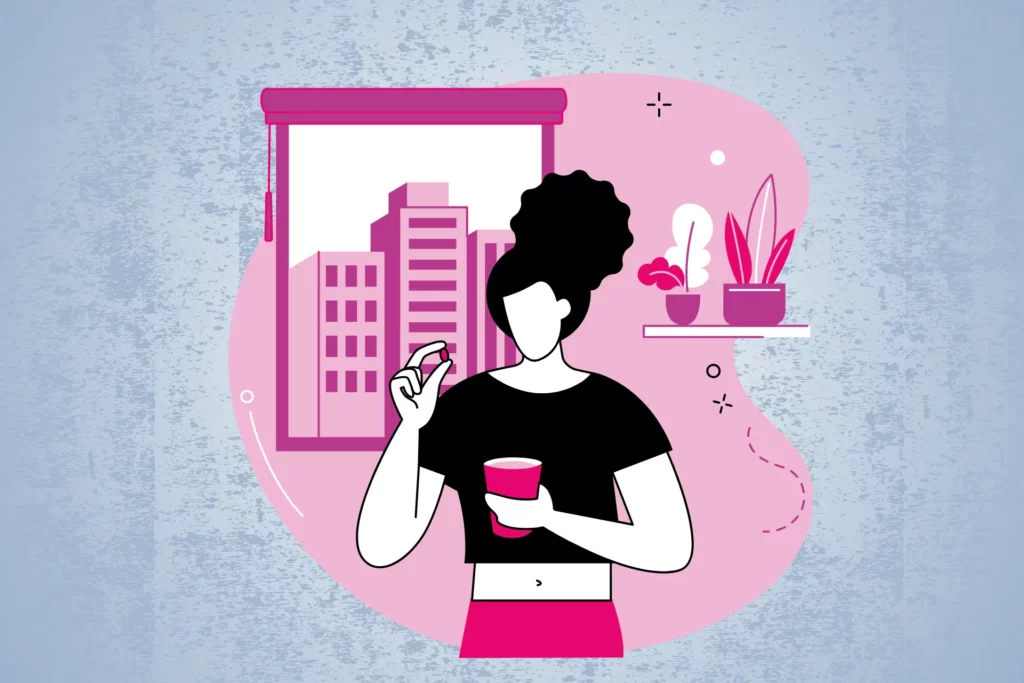
DHEA For Weight Loss: How Does It Work

Combating The Yo-Yo Effect: Avoiding Weight Regain After A Diet
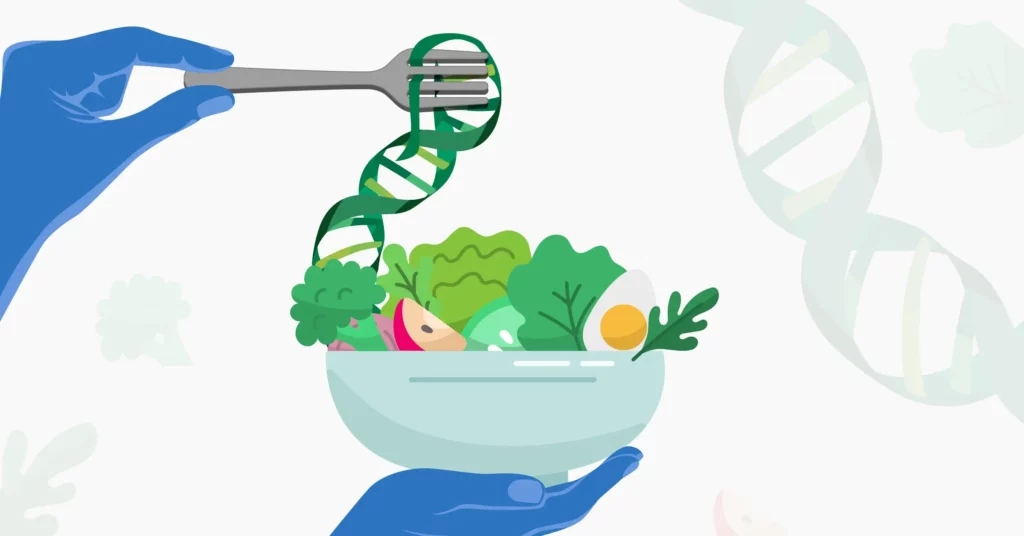
How It Works: Genetic Testing For Weight Loss
https://www.drugs.com/semaglutide.html
https://link.springer.com/article/10.1007/s40618-024-02309-2
https://www.uclahealth.org/news/article/semaglutide-weight-loss-what-you-need-know
https://www.ncbi.nlm.nih.gov/pmc/articles/PMC9293236
https://www.webmd.com/drugs/2/drug-174491/ozempic-subcutaneous/details
https://www.ncbi.nlm.nih.gov/pmc/articles/PMC8961394
https://www.ncbi.nlm.nih.gov/pmc/articles/PMC10874596
https://www.ncbi.nlm.nih.gov/pmc/articles/PMC3281535
https://www.ncbi.nlm.nih.gov/books/NBK603723
https://www.medicalnewstoday.com/articles/drugs-ozempic-side-effects
https://www.ncbi.nlm.nih.gov/books/NBK603723
Ever wondered where your grandfather’s grandfather’s grandfather lived or what he did for a living? Then, Family Tree DNA (FTDNA) is your tool of choice. It was established in 2000 and is regarded as one of the most trusted and reliable providers of DNA testing services. The company started out offering only Y-DNA, mtDNA, and Cohanim DNA tests. Ten years later, the company began offering autosomal testing with its ‘Family Finder’ product, which remains the leading choice among professional genealogists for DNA testing. This product has attracted many genealogists; thus, there is plenty of online support for understanding and using your test results.
FTDNA offers tests for autosomal DNA, YDNA and mTDNA.
This test focuses on the autosomal DNA, which is inherited across generations. With this test, you can:
Family Finder by Family Tree DNA examines over 50,000 markers to trace the ancestral line of the user.
The analysis provides details of the user’s ethnic origin as well.
FTDNA uses a proprietary algorithm to discover individuals who may have a common ancestor within five generations on either side of the user’s family.
The test provides the names and email addresses of closely related individuals to aid in initiating contact.
Since personal information is involved, FTDNA only matches users with others who’ve also opted for the test.
This test is ideal for anyone who wants to learn more about their family’s heritage, culture, or ethnic background.
It matches the user to close relatives and breaks down their ancestor’s origin.
This test reveals the user’s and their family’s unique genetic identity.
You can send your DNA data through a physical kit (supplied by FTDNA) or upload a raw DNA data file from 23andme, MyHeritage, or AncestryDNA.
FTDNA recommends purchasing their kit to avoid missing out on any genetic information the tests might need.
The kit, which you can order on the site, contains:
A basic test, costing $80, takes up to 6 weeks.
More complex tests can take up to 8 weeks.
Once the results are ready, you can access your complete genetic profile.
There are four segments of the Family Finder report
A breakdown of your geographical ancestry and ethnic background.
It contains a map with a ‘My Ancestral History’ panel for historical context on each result.
This feature, available only to people of European descent, searches for genetic matches to reveal migration routes across Europe and other groups that your ancestors may have interacted with.
It also reveals details such as the age at which they would have been living in a given region and the jobs they performed.
A map helps us understand these better.
This service creates a family tree.
It matches your genetic profile to other users and relatives most likely to fall in your maternal or paternal ancestral lines.
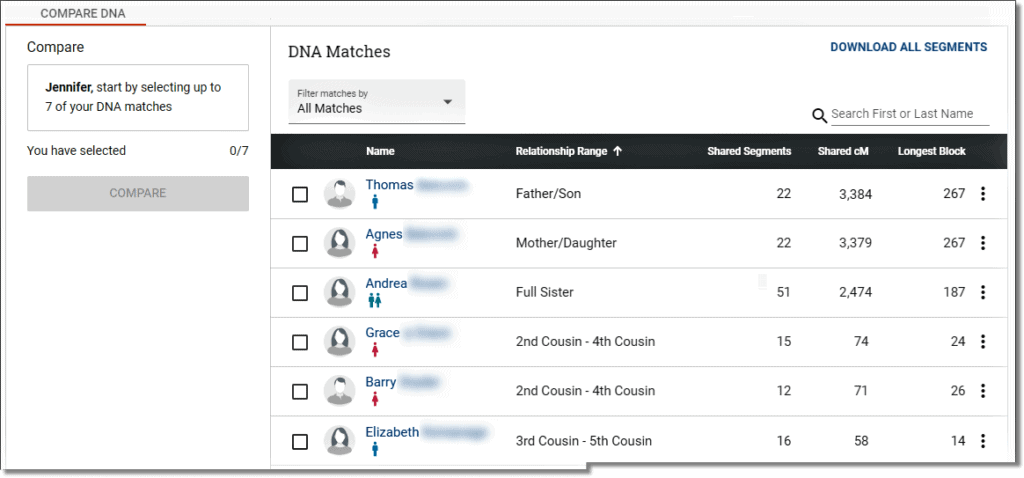
Compares matching DNA segments with your genetic matches to reveal areas of similarity.
Chromosome Painter is another tool that helps reveal the ethnic source of each segment of your chromosomes.
The Y chromosome is exclusive to the male gender and is often passed down from the father to the son without much changes in the genetic makeup.
Y-DNA tests the Y chromosome to investigate the male’s paternal family line.
A person taking this test will also receive a ‘Y-DNA haplogroup,’ which uncovers a paternal heritage going back to Africa, the cradle of life.
The following are the available YDNA test options:
| Y-37 | Y-111 | Y-700 |
| Costs $119 | Costs $249 | Costs $449 |
| Studies 37 genetic markers | Studies 111 genetic markers | Studies 700+ markers and 600k+ SNPs |
| Locates distant relatives | Can locate closer relatives | Can locate all relatives within a certain time frame |
| Less detailed migration map | Less detailed migration map | Highly detailed migration map |
Note that these tests are often on sale, with prices sometimes slashed by dozens of dollars.
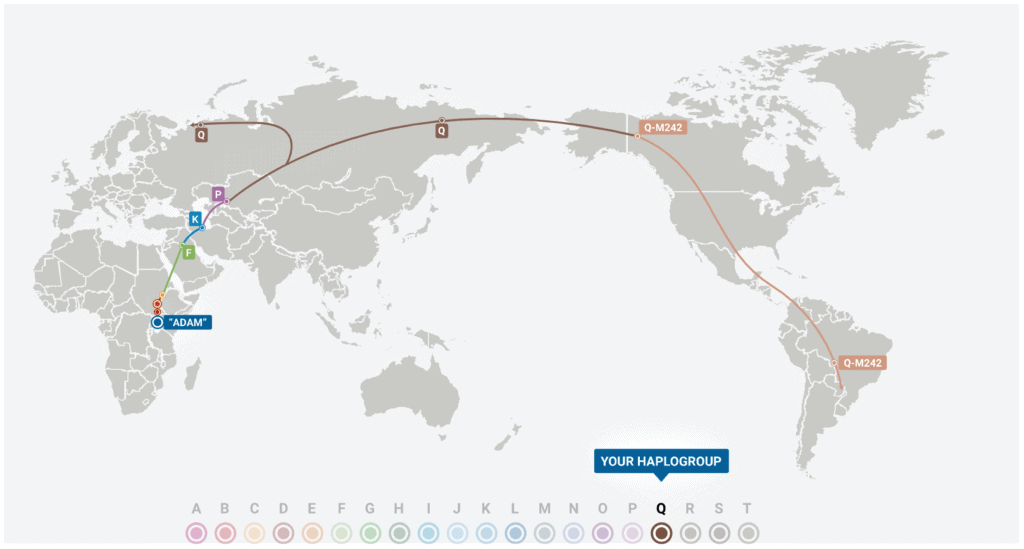
mtDNA stands for mitochondrial DNA.
A mother passes on this DNA to her children.
Though daughters and sons receive it from their mothers, men cannot pass it on to their children.
This test allows you to explore your direct maternal line and geographic origins.
You also learn about the migration patterns followed by your maternal ancestors.
mtDNA haplogroup uncovers your maternal heritage going back to Africa.
Since mtDNA mutates slowly, this test cannot tell much about your recent maternal generations.
The mtDNA test costs $159 on FTDNA’s website.
This feature, available for all users who have taken the mtDNA test, tells the story of your maternal ancestry and is a fun way to share your results with friends and family.
Since this feature is customizable, you can choose your avatar and provide some information about yourself. Take a look at the sample video below.
This video explains the basic concepts of your mtDNA results with your specific story in mind.
Source: FamilyTreeDNA Youtube channel
In July, MyHeritage announced an integration of FTDNA’s services into their website.
FTDNA’s users could easily transfer their family trees to MyHeritage and continue to build upon them there.
Since FTDNA doesn’t have the range of tools available on MyHeritage, this collaboration benefits users who can extract new insights from their family trees.
Additionally, FTDNA plans to end support for their family tree builder by September 9, 2024.
FTDNA users will be requested to transfer their existing trees to MyHeritage.
In early January, FamilyTreeDNA merged with myDNA, an Australian pharmacogenetics company. FTDNA’s CEO stepped down. MyDNA focuses on lifestyle and wellness aspects like vitamins, minerals, and skincare.
After this merger, FTDNA customers received a “Health & Wellness Discovery Survey” that asked questions about health, fitness, and other lifestyle aspects, not genealogy or ancestry.
This news raises questions about the direction in which FTDNA is headed!
FTDNA is a good choice for people wanting to learn more about their ancestry.
However, there are also some disadvantages to this test:
23andMe and FTDNA enable customers to connect to close relatives.
While 23andMe’s DNA relatives came out in 2009, FTDNA released Family Finder a bit later in 2010.
Although FTDNA has a smaller database, its services surpass those of 23andMe. Features include maternal and paternal lineage tracking, a variety of tests, and a detailed report.
FTDNA provides easy-to-use DNA analysis kits to users who want to learn about their ancestry.
Regarding privacy, FTDNA provides options to opt out of law enforcement matching.
However, completely deleting genetic data or destroying a sample is quite tricky.
If a customer decides to do so, they must contact customer service.
With the tests and services provided, the user can learn about their maternal and paternal ancestry and the potential migration paths of their ancestors, including occupation and location.
Finally, FTDNA enables users to contact close relatives to promote positive relationships.
With features like accepting raw DNA files from other testing services and wellness reports, FTDNA is the better choice for DNA analysis services.
Upload your DNA raw data to Xcode Life to get insights into 700+ health-related traits!
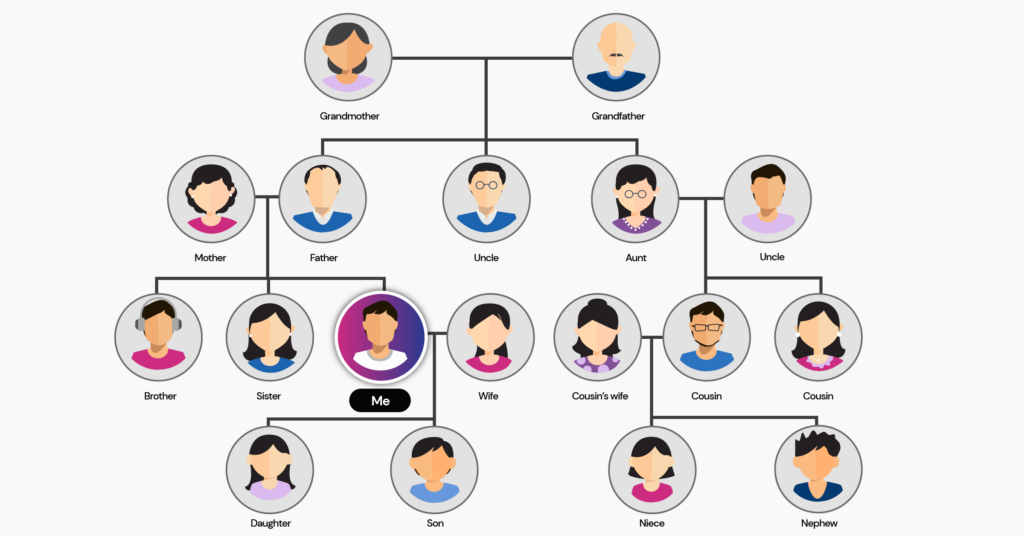
How To Use 23andMe Family Tree?

How To Download Family Tree DNA Raw Data File?
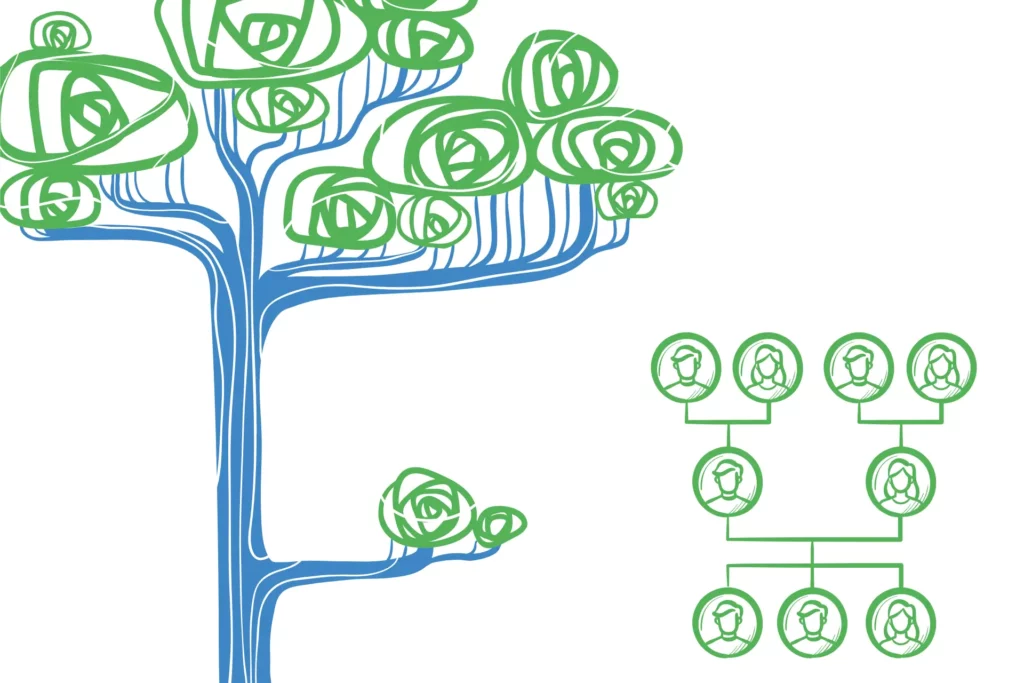
FamilyTreeNow: Free People Finder and Family Tree Builder Tool [2024]
FTDNA has a robust security policy protecting its users' personal information. It also gives users ample control over how their DNA data is processed, shared, and stored.
While FTDNA is one of the best tools available to trace back your maternal and paternal lines, Ancestry’s database and accuracy are much better than those of most of its competitors.
Since different companies use different data and analyze different markers, results can vary between services. Limited data from some remote ethnicities may cause those results to become increasingly vague.
Did you know that approximately 39 million U.S. adults and 936 million people worldwide suffer from a serious form of sleep apnea? With snoring affecting up to 94% of patients, it’s clear that sleep apnea is a widespread issue. But what if your genes influence your risk of developing sleep apnea? Are certain people more likely to suffer from this condition due to inherited traits? And how can you manage and treat sleep apnea if it runs in your family? In this article, we delve into whether sleep apnea is genetic, explore the risk factors, and review the most effective treatments.
Sleep apnea is a disorder characterized by frequent interruptions in breathing during sleep, called apneas, which can last from a few seconds to a minute.
These interruptions disrupt sleep patterns, resulting in fragmented and poor-quality sleep.
The condition can lower blood oxygen levels, straining the cardiovascular system.
Sleep apnea is often undiagnosed because it occurs during sleep, and the individual may be unaware of it.
It is a severe condition that requires medical intervention to prevent long-term health complications.
Sleep apnea is generally classified into three primary categories:
Sleep apnea presents a variety of symptoms, which can differ in their visibility and impact. Key signs include:
Sleep apnea can exhibit different symptoms in children, including:
Recognizing these symptoms can help diagnose and manage sleep apnea effectively.
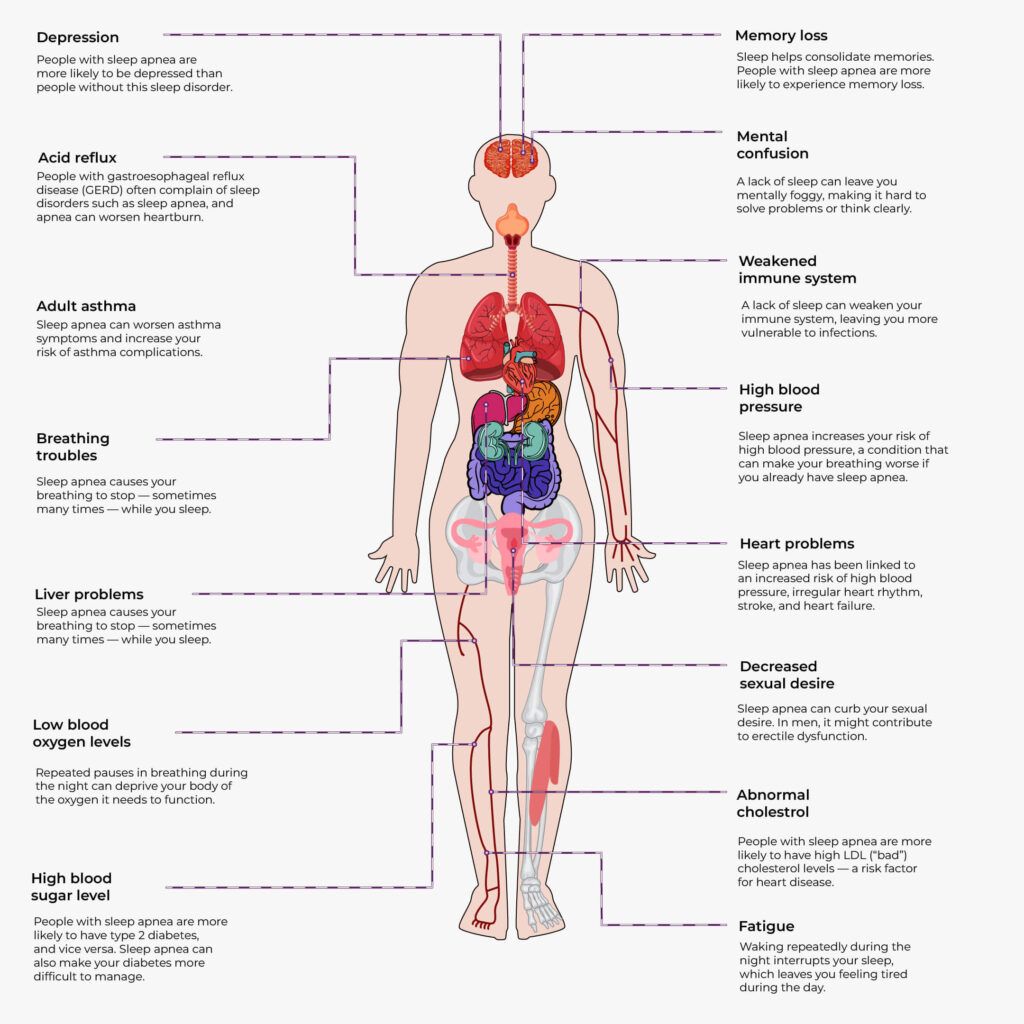
Sleep apnea is a complex trait that has genetic, lifestyle, and environmental influences. No single gene causes sleep apnea. However, the effect of small variations (or changes) in multiple genes combined together can increase the risk of sleep apnea.
| Type of sleep apnea | Genetic link | Details |
| OSA | Strong | Multiple genes contribute to OSA development. Genetics account for approximately 40% of the variation in OSA severity. |
| CSA | Weaker | Possible genetic predisposition, but primarily caused by non-genetic factors like brain respiratory control issues. More research is needed. |
CSA is not known to be inherited, but OSA can run in families. If a parent, sibling, or child has OSA, you’re about 50% more likely to develop it yourself.
CSA is often linked to other medical conditions or certain medications.
In contrast, OSA is linked to genetic traits that affect the structure of your airway, and certain inherited physical features can increase your risk of developing it.
Genetic factors can influence several physiological traits that increase the risk of OSA.
These factors do not directly cause sleep apnea but can make someone more likely to get it.
Key contributors include:
Several genes have been identified as potentially related to sleep apnea:
These genes are linked to physiological processes influencing OSA risk, including responses to hypoxia and airway muscle tone regulation.
Further research is needed to fully understand the role of these genes and their interactions in the development of sleep apnea.
About Xcode Life's Gene Sleep Report
The root cause of sleep apnea varies depending on its type.
Multiple factors can heighten the risk of developing sleep apnea, including both obstructive and central forms:
You can't control your genes, but you can control your lifestyle. Even if you're genetically predisposed to sleep apnea, making healthy choices can significantly lower your risk.
Key measures include:
*The contents of the article are for informational purposes only. Do not stop any medications without consulting your medical practitioner.
Genetic sleep apnea, involving inherited factors that affect the upper airway or respiratory control, can be managed through a combination of lifestyle changes.
Even with its genetic basis, various treatment options exist to address this condition effectively.
Here's an overview of treatment options for genetic sleep apnea:
These management and treatment options can help individuals with genetic sleep apnea lead healthier lives by improving breathing during sleep and addressing related health concerns.

Can Sleep Apnea Lead To Brain Damage?

Sleep Issues: Why Do I Keep Waking Up At 4 AM?

The Top 3 Methods To Fall Asleep Faster
https://www.ncoa.org/adviser/sleep/sleep-apnea-statistics
https://www.nhlbi.nih.gov/health/sleep-apnea
https://www.mayoclinic.org/diseases-conditions/sleep-apnea/symptoms-causes/syc-20377631
https://my.clevelandclinic.org/health/diseases/8718-sleep-apnea
https://www.medicalnewstoday.com/articles/317313
https://www.webmd.com/add-adhd/attention-deficit-hyperactivity-disorder-adhd